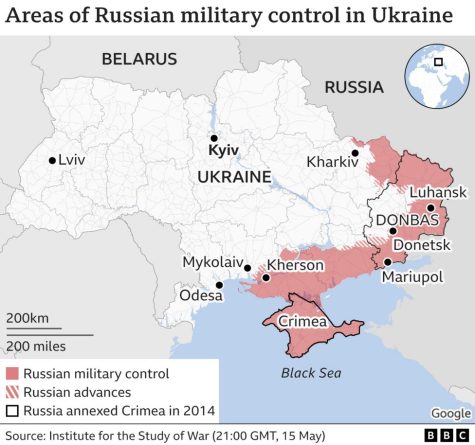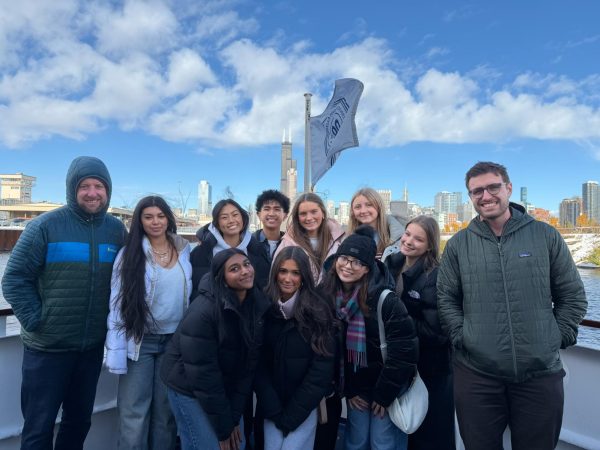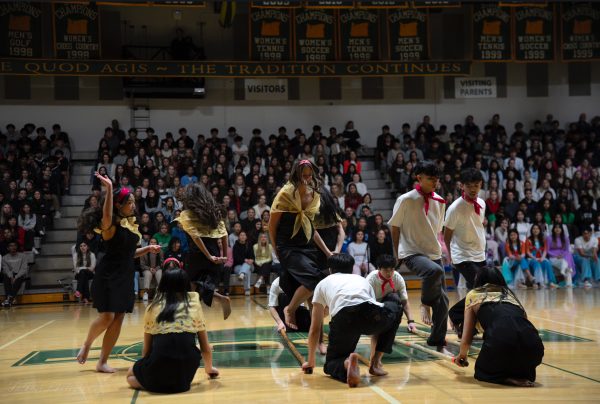Russia, Sanctions, and Oregon Gas
The ARCO gas station near Jesuit off of Beaverton Hillsdale Highway on May 9, 2022.
Overview: Russia and the Energy Sector
Oregon gas prices reached a new high this Monday at $4.99 per gallon breaking the record set back in March of $4.76 per gallon. The ongoing war in Ukraine and downstream economic pressures have accelerated the increase of gas prices that started during the spring and summer of 2021 (Oregon Gas Price News).
According to AAA, as of Monday, Portland gas prices are $5.06 per gallon of standard gasoline. Current average gas prices per gallon in Oregon are up from roughly $3 last year. Oregon ranks 45th in the nation behind Washington, Hawaii, Nevada, and California.
Outside of 2022, the summer of 2009 had the highest gas price of $4.29 a gallon, or $5.65 with inflation (Gas Prices Hit New Record Highs).
This steep increase in energy prices is expected to decline to normal levels over time as the U.S. releases oil barrels and the Russian Federation uses reserves to keep key industries afloat and pay off debts (New U.S. Sanctions).
Sanctions: What are They and What Makes a Good Sanction
A large driver of these changes is the ongoing war in Ukraine because of the Russian Federation. The shock of the invasion has affected the market and has caused countries to sanction the Russian Federation and its oligarchs.
Sanctions are economic and diplomatic tools that show a country disapproves of another country’s actions. Sanctions include and go beyond embargoes. Other types of sanctions include stopping peace talks, withdrawal of diplomats, or prohibiting investments (Economic Sanctions: A Valuable Weapon?).
Two main types of sanctions are multilateral and unilateral. Examples of multilateral sanctions are sanctions against South Africa under apartheid and Afghanistan under the Taliban. An example of a unilateral sanction is the U.S. sanctions on Cuba.
Multilateral sanctions are used by international organizations including the European Union (EU), the North Atlantic Treaty Organization (NATO), the Group of Seven (G7), and mostly the United Nations (UN).
In terms of the UN, sanctions need to be passed by the security council which the U.S., France, the United Kingdom, China, and the Russian Federation all have permanent seats as well as the power to veto. Sanctions utilized by the UN are often limited to conflicts such as the civil war in Somalia as sanctions against a country with a permanent seat in the council will be vetoed.
A benefit of these sanctions is that they avoid some of the pitfalls of unilateral sanctions. Multinational implementation of sanctions generally have better defined goals as they are passed by multiple countries. Another positive of multilateral sanctions is that they minimize the risk of the country being sanctioned establishing closer ties with a country not imposing sanctions and deciding to finance them (Economic Sanctions Reconsidered).
In the context of the ongoing invasion of Ukraine, most sanctions are implemented by the U.S. or G7 with NATO and the EU typically following suit. These multilateral sanctions on Russia include banning oligarchs and politicians, sanctioning major industries such as oil, gas, and mining, and restrictions on Russian defense companies.
History: Historical Comparisons and Past Sanctions on Russia


The Russian Federation has a history of being sanctioned and has weathered through previous sanctions. The annexation of Crimea by the Russian Federation and the international response is in some ways similar to the current Russian Federation’s invasion of Ukraine and its international response.
Russia’s claim on Crimea, like the current war, is controversial and Crimea is broadly recognized as being illegally annexed during an invasion of masked unmarked armed troops (Crimea).
However, the timeline and backlash of Crimea differs from the current situation. Partially because of the swiftness of military takeover, the U.S. imposed sanctions more unilaterally.
The restrictions of Russian oligarchs were generally multinational. However, oligarchs tend to have the most influence and are best equipped to deal with any economic tools used against them.
Key industries that the U.S. sanctioned, such as financial and energy, the U.S. acted alone in, which may have had a large impact on what became of these sanctions (Ukraine: Current Issues).
During this time, the Russian economy experienced a roughly 8% contraction mainly caused by an international fall in oil prices and the Russian Federation’s fiscal policy. The sanctions accounted for roughly 2% of this decrease according to an International Monetary Fund report.
Analysis: Future of the Conflict and Impact of Sanctions so Far

Originally the Russian Federation planned to invade Ukraine quickly and were expected to win.
“The initial plan was something similar to Budapest in ’56 and Prague in ’68,” history teacher Mr. Hunnicutt said. “Roll in the armor, quell any token resistance, and install a new government. It would all be over in 72 hours.”
When troops built up in Russia and Belarus along Ukraine’s border, many expected that if the Russian Federation invaded, it would be a quick victory.
“To the surprise of most observers, myself included, that did not happen, and it seems Putin has been forced to radically and embarrassingly change his goals,” Hunnicutt said.
With this original failure from the Russian Federation, there has been a harkening back to World War II and the Cold War USSR with Putin talking about “soviet identity”, including Ukraine and Crimea, and use of his stated war goals.
The Russian Federation’s stated goals are to contain NATO, protect the Donbas, and to denazify and demilitarize Ukraine. These claims have been highly contested as propagandistic, vague, and giving Putin the opportunity to declare victory whenever he needs to.
In terms of denazifying Ukraine, President of Ukraine Volodymyr Zelenskyy and Prime Minister Denys Shmyhal are both Jewish. Despite there being legitimate concerns over the far-right Azov Battalion, the Russian Federation’s original claim of Nazis in the Ukranian Government has been widely scrutinized (Why Vladimir Putin Invokes Nazis).
Due to these goals being vague and nebulous, it is easier for Putin to consider his invasion a success and declare victory. Declaring even a nominal victory is important because of how the Russian army has struggled.
“I don’t think Putin is crazy but he needs a win to justify all that has gone wrong with his initial plan” Hunnicutt said. “Taking over the Donbas Region and hanging on to the Crimea seems to be the new goal, though the shockingly poor performance of the Russian military has made even this limited task very difficult.”
Despite sanctions tipping the scales, it is still very unclear what the future of the conflict holds as killings continue and Putin makes threats that he could use nukes (How Mad is Vlad?).
“I think the situation is very dangerous with no clear end in sight,” Hunnicutt said. “My hope is that the killing and destruction will stop.”
However, the U.S., G7, and EU have made it clear they intend to supply defensive weapons to Ukraine and continue sanctions. These sanctions, more so than the sanctions following the annexation of Crimea, affect the general economy in addition to trying to influence oligarchs.
The intention of more widespread sanctions is to not repeat the response in Crimea and “that the masses will feel the impact and potentially speak out or resist the Russian invasion of Ukraine although Russian media will tell a different story,” history department chair Ms. Bernards said.
From a messaging perspective, the White House released a statement that described the recent sanctions as “severe and immediate costs on Russia” in response to Putin’s “atrocities in Ukraine, including in Bucha”.
In a succinct interview after arriving in Texas, President Biden summarized how for gas prices he “[c]an’t do much right now. Russia is responsible” (Remarks by President Biden After Air Force One Arrival).
In terms of the effect on the Russian Federation’s economy, these sanctions are the most severe and extensive the Russian economy has experienced. Because many countries are sanctioning the Russian Federation, countries supporting its economy and establishing closer ties are rare with India and China being some of the few exceptions (India Wants to Buy Russian Oil).
Countries not imposing sanctions allying more closely with the Russian Federation would hinder the efforts of what countries imposing sanctions are trying to do.
“If Russia can continue to work with other nation states economically then they will just shift their trade and financial transactions to those nations,” Bernards said.
The Russian ruble originally lost almost half of its buying power when compared to the United States dollar. However, the ruble has somewhat recovered in what the U.S. treasury says is inflated by the Russian central bank.
The Russian Government has also requested that Russian gas contracts be paid in rubles in order to stimulate demand for the currency.
“Russia is simply trying to prop up the ruble by using it as much as possible,” Bernards said. “If other nations agree to continue to use the ruble this will help maintain the value and the legitimacy of the currency.”
A more accurate measure of the Russian economy may be consumer pricing and inflation. Inflation peaked at 17.3% in March and the Russian market is expected to contract roughly 15% by the end of 2022 (How Sanctions Are Affecting the Russian Economy).
A less tangible effect of Putin’s actions is how countries who were closer to Russia have renewed efforts on becoming less reliant on the Russian energy sector. One country with major policy changes since 2014 is Germany who has stopped the Nord Stream 2 pipeline and began sending arms to Ukraine. The original Nord Stream pipeline runs from Russia to Germany under the Baltic Sea and was constructed in 2011.
These changes to German policy are likely to stay as the view of Putin’s war of aggression becomes more common internationally and in Germany (German Paradigm Shift).
“I think the economic sanctions by the West will hurt the Russian Federation long term, especially as it has sped up western nations’ desire to stop their dependency on Russian oil and gas exports, but in the short term I think it will have little effect on Putin and his efforts in Ukraine,” Hunnicutt said.









